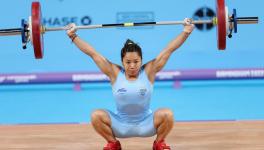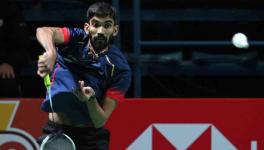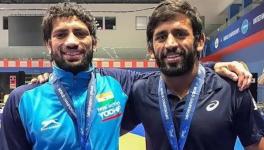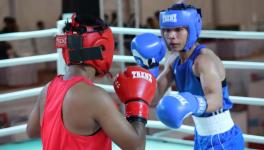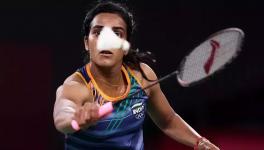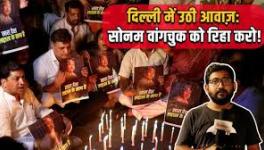Grit, Hunger and Obscurity: Can Mirabai Chanu’s Olympic Silver Change the Manipur Athlete Storyline?
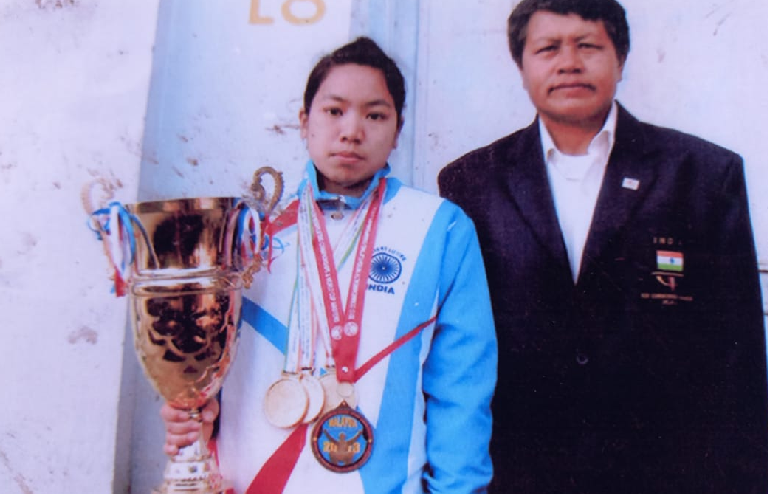
A young Mirabai Chanu with coach Laishangbam Anita Chanu (Pic: Anita Chanu).
“When you give your life to a sport, you always hope to get a reward like this. You dream of it, and work for it, but when it happens, well,” Laishangbam Anita Chanu’s voice finally cracks with emotion, barely discernible over the phone, but enough. You get it. “And now, my phone has exploded. Not just with media calls, but also other kids, parents, coaches, all asking when training will begin.”
There were 50 kids at the weightlifting academy in the Khuman Lampak Stadium in 2006 when a young, diminutive girl made her way in tentatively, wondering how she could apply. The girl came searching for an archery coach but having failed, peeked into the weightlifting hall and pondered a change of course.
Click | For More Coverage of the Tokyo Olympics From Newsclick Sports
“She was 12 years old. I remember clearly. She had good muscle definition, the correct height and body dimensions and even had the interest,” Chanu says. “We put her through some tests we do for every athlete who comes in and she performed well in them. Most importantly mentally woh bohot strong thi. Abhi bhi Mirabai mentally strong hai (mentally she was very strong. She still is mentally very strong).”
Chanu’s phone has been abuzz ever since her ward won silver on the opening day of the Tokyo Olympics. “The CM called the other day,” she says, her voice a mixture of pride and exasperation. “He offered congratulations, but more importantly, he said the government wanted to extend support to build more academies, better facilities, and scout across all districts.... he asked for a budget of sorts. So we are working on it.”
Chanu has been honoured with the Dronacharya already, and is one of the pioneers for weightlifting in the country. It was her and Kunjarani Devi, whose exploits became the catalyst for a host of others in Manipur to follow. In 1990, after a bitterly disappointing Asian Games — an injury saw her finish just outside the medal places, in fourth — Chanu returned home to rethink her life.
Also Read | Saturday High to Sunday Low: Australia Serve India a Seven Goal Reality Check
“I realised that the injury would never heal well enough for me to be able to perform at the top of my ability. But I had to stay involved with this sport. It has given me everything. I started lifting in 1975, when I was nine years old. It isn’t easy to give this up, you know.”
The rethink turned her into a coach. She decided to teach kids to do what she could, but also “win things I never did. It sounds selfish maybe, but I wanted to live through their victories. I don’t claim them, I just want to rejoice in them.”
In a brutal sport like weightlifting, where injuries, burnout, overtraining and fatigue don’t just impact performances but often kill entire careers, Chanu has consistently focussed on just keeping the girls she trains focussed on what they can control. The main reason men from the state have always underachieved in the sport, she says, is because they overtrain, get too ambitious and start dreaming big too early. And of course: “The girls are mentally much stronger. They don’t complain. If they only get rice and dal to eat, they’ll eat it happily.”
There is no better example of this than the story of Mary Kom, mother of three and legend of many. But now a new star has emerged, and her story is even better, retold over many column inches, several times over the past three days. Mirabai Chanu carried firewood as a kid. She grew up in a family with low resources and many mouths to feed. She would travel from her village Nongpok Kakching to Imphal in buses and tuk-tuks, and when unable to find either, hitch rides on trucks and tractors. She wants to eat pizza now. All of them are glorious, legend building, inspirational tales, but also highly questionable — not for their factual accuracy but for why it is so at all.
Also Read | Brawler to Artful Dodger, the Evolution of Mary Kom is Complete in Tokyo
Greatness always comes out of adversity and trauma, but in Manipur, a state that has trauma unlike any other, greatness is a stone’s throw away. Attend a football game at the Khuman Lampak stadium and in the stands you will be surrounded by India internationals, Santosh trophy legends, Kolkata derby heroes and modern day Indian Super League (ISL) stars. Walk into a boxing club and you will, in all probability, end up bumping shoulders with an Asian medallist. Go to the SAI centre and at any single point in time there are fencers, judokas and hockey players around who have represented India at various age groups. Almost all come from humble, rural backgrounds or even humble backgrounds within Imphal. Almost all have struggled to get where they are, battled hard for every inch of resource because that’s all there is.
There is a phrase whispered at national sporting events, never spoken aloud, but regarded almost as maxim. The Manipuri athletes are tough. Why so? Because they have come from little, go back to little and regard everything in the middle as incidental. If Rudyard Kipling had gone to Manipur, ‘If’ would’ve been a different poem in itself.
Chanu embraces the media attention, the scrutiny and the public spotlight that has fallen on the state following her ward’s silver in Tokyo, but also hopes this will translate into more than just words and praises. “Everyone knows it is difficult to get funding in Manipur. There are coaches and scouts in districts who do this noble work on a voluntary basis. There is very little reward,” she says. “Whatever funding there is comes from the government and it’s good, but often not enough. That’s why our boys and girls go out to train. The facilities here are only good enough to lift you to a certain level. After that, you’re forced to move on.”
Also Read | Bad Luck, Poor Form or Lack of Edge? The Case of the Missing Indian Shooting Stars in Tokyo
Mirabai moved on too. Chanu worked with her till 2015, and then she was called to the National camp in Sonepat, before going for further training to America. They stay in touch via phone. Chanu says the young weightlifter often sponsors and assists young trainees at the academy financially when informed of their troubles. But she hasn’t been home in a long while now. When she does return now, it will be to a party. The state government announced a Rs 1 crore award for athletes who win silver at the Games, one Chanu hopes they will fulfill.
“In the end this is why a lot of boys and girls play sports. They want to win medals for sure, but they also want financial security, they want jobs,” she says. Mirabai isn’t immune to these human vices. Chanu says the weightlifter has been hoping to get a promotion in her Railways job for a few years now, and Chanu has been working to convince the authorities she is worth it.
“Now I don’t have to. She has done it herself. I always told her to just cut out the external noise and go and perform like only she can. And now that she’s done it,” Chanu sighs, “Its beautiful.”
Get the latest reports & analysis with people's perspective on Protests, movements & deep analytical videos, discussions of the current affairs in your Telegram app. Subscribe to NewsClick's Telegram channel & get Real-Time updates on stories, as they get published on our website.









